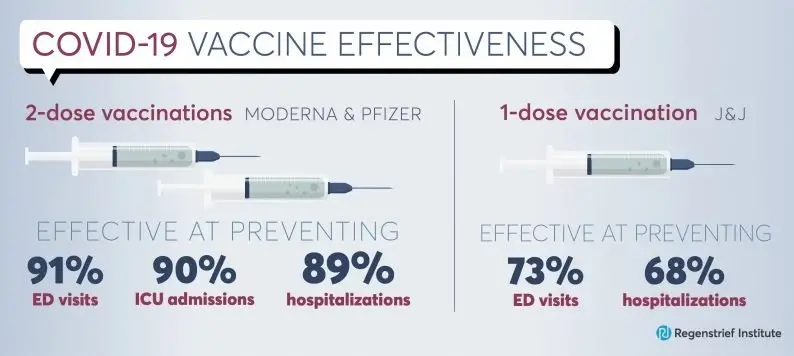
What You Should Know:
– Real world evidence from electronic medical records (EHR) data reveals the COVID-19 vaccines are highly effective at preventing hospitalizations, emergency department visits and intensive care admissions due to the virus, according to a study just published in the New England Journal of Medicine (NEJM).
– The study, “Effectiveness of COVID-19 Vaccines in Preventing Ambulatory and Inpatient Care” analyzes actual data from hospitals around the US and shows that 2-dose COVID-19 vaccinations.
– The study also found that vaccines provide high levels of protection for populations disproportionately affected by the virus, including older adults and minorities.
NEJM Research Study Background & Protocols
The U.S. Centers for Disease Control and Prevention (CDC) collaborated with six U.S. healthcare systems plus the Regenstrief Institute, to create the VISION network to assess COVID-19 vaccine effectiveness. Regenstrief, Columbia University Irving Medical Center, HealthPartners, Intermountain Healthcare, Kaiser Permanente Northern California, Kaiser Permanente Northwest and University of Colorado all contributed hospitalization and ICU data for patients older than 50 from a total of 187 hospitals, in addition to data from emergency departments and urgent care clinics. The data covered 45,000 medical encounters.
Moderna and Pfizer COVID-19 Effectiveness
Data analysis finds 2-dose mRNA vaccination (Moderna and Pfizer) was:
– 89 percent effective at preventing COVID-19 hospitalizations
– 91 percent effective at preventing COVID-19 emergency department or urgent care visits
– 90 percent effective at preventing COVID-19 intensive care unit admission
– The effectiveness was significantly lower in individuals who received only the first dose of the two shot-vaccination.
J&J Single Dose Effectiveness
This study was also one of the first to look at the effectiveness of the single-dose Johnson and Johnson vaccine. It was found to be 73 percent effective against emergency department and urgent care visits, and 68 percent against hospitalizations. However, the authors note the smaller sample size may affect the precision of these estimates and state that more data is needed.
“This real-world evidence corroborates the results of clinical trials and provides even more confidence in the vaccines,” said paper author Shaun Grannis, M.D., M.S., Regenstrief vice president for data and analytics and Indiana University School of Medicine professor of family medicine. “This study is an excellent example of how EHR data can be leveraged for public health, and how collaboration between health entities can provide new and beneficial insights.”